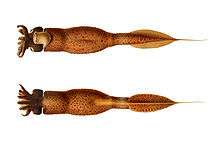Taonius pavo
Taonius pavo is a species of glass squid found in the Atlantic Ocean. Its exact geographic distribution is uncertain, but it may extend to the southwestern Indian Ocean through the Agulhas Current.[3]
| Taonius pavo | |
|---|---|
 | |
| Drawing of Taonius pavo | |
| Scientific classification | |
| Kingdom: | Animalia |
| Phylum: | Mollusca |
| Class: | Cephalopoda |
| Order: | Oegopsida |
| Family: | Cranchiidae |
| Genus: | Taonius |
| Species: | T. pavo |
| Binomial name | |
| Taonius pavo | |
| Synonyms[2] | |
| |
They are eaten by the sperm whale in Southeast Asia, southern Australian, Hawaiian, and North Atlantic waters[4][5][6][7].
See also
References
- Barratt, I.; Allcock, L. (2014). "Taonius pavo". The IUCN Red List of Threatened Species. 2014: e..T162942A955784. doi:10.2305/IUCN.UK.2014-1.RLTS.T162942A955784.en. Downloaded on 28 February 2018.
- Finn, Julian (2016). "Taonius pavo (Lesueur, 1821)". World Register of Marine Species. Flanders Marine Institute. Retrieved 28 February 2018.
- Young, Richard E. (March 8, 2011). "Taonius pavo (Lesueur, 1821)". The Tree of Life Web Project. Retrieved March 16, 2012.
- Chua, Marcus A.H.; Lane, David J.W.; Ooi, Seng Keat; Tay, Serene H.X.; Kubodera, Tsunemi (5 April 2019). "Diet and mitochondrial DNA haplotype of a sperm whale (Physeter macrocephalus) found dead off Jurong Island, Singapore". PeerJ. 7: e6705. doi:10.7717/peerj.6705. PMC 6452849. PMID 30984481.
- Evans, K; Hindell, M (December 2004). "The diet of sperm whales (Physeter macrocephalus) in southern Australian waters". ICES Journal of Marine Science. 61 (8): 1313–1329. doi:10.1016/j.icesjms.2004.07.026.
- Clarke, Malcolm; Young, Richard (11 May 2009). "Description and Analysis of Cephalopod Beaks from Stomachs of Six Species of Odontocete Cetaceans Stranded on Hawaiian Shores". Journal of the Marine Biological Association of the United Kingdom. 78 (02): 623–641. doi:10.1017/S0025315400041667.
- Martin, A.R.; Clarke, M. R. (11 May 2009). "The Diet of Sperm Whales (Physter macrocephalous) Captured Between Iceland and Greenland". Journal of the Marine Biological Association of the United Kingdom. 66 (04): 779. doi:10.1017/S0025315400048426.
External links

This article is issued from Wikipedia. The text is licensed under Creative Commons - Attribution - Sharealike. Additional terms may apply for the media files.
